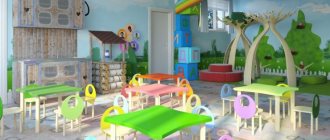Parents' corner according to FROGS in kindergarten: important design rules
Parent's corner according to FROGS in kindergarten: important design rules
Most people don’t even think about the fact that parent’s corners in kindergartens must be designed in accordance with some rules. But in fact, there is even a special passport that specifies the characteristics of the corner.
The passport contains the following information:
- Initially, the name of the parent’s corner is written in the passport, for example, the “Health” corner, the “First-Grader” corner.
- Next comes a description of the group - its number is indicated, as well as the exact age of the children who attend it.
- Further, the passport indicates the purpose for which the parent corner was created, for example, in order to tell parents what the children did today, or when the holiday matinee will be held.
- It also indicates what visual materials were used, as well as their quantity, for example, wall posters or special maps.
- If the corner has a thematic focus, for example, helping parents teach their children, then the passport contains a card index of games and exercises that are recommended to parents.
Parents' corner according to FROGS in kindergarten - important design rules:
- The parent's corner should satisfy not only the interests of parents, but also children, according to their age. This means that while mom or dad is studying information, the baby should also be busy with something. For example, even looking at funny pictures.
- Visual aids and materials also need to be selected taking into account the age of the children in the kindergarten group. So, in the nursery group there is no need to place stands with the alphabet. This age category is currently only interested in bright pictures.
- The parent's corner should look as aesthetically pleasing as possible. It is best to use bright colors and more beautiful fonts for headers and titles.
- The corner should be located in the most convenient place. It should be well lit, otherwise it will be difficult for parents to read the information that is written in small print. If it is not possible to place the stand in the brightest part of the room, you need to consider an additional light source.
- In the parent's corner of the kindergarten there must be information that takes into account regional characteristics - life, crafts, types of art, language.
Recommendations for parents on the topic of the week
Dear parents!
Theme of the week from 14.09 – 18.09 “Gifts of autumn.” “Where did the bread come from?”
Target:
develop cognitive interest, interest in school, in books. To consolidate children's knowledge about school, why they need to study, who teaches what at school, about school supplies, etc. to form positive ideas about the teacher’s profession and the “profession” of the student.
This week's final event:
holiday "Day of Knowledge"
Contents of educational activities:
Cognitive development (the world around us)
"Day of Knowledge"
Target
: expand children’s ideas about school; show children the social significance of the holiday - Knowledge Day; introduce school supplies; develop speech, thinking, memory of children; cultivate interest in educational activities, bring joy, create a cheerful festive mood. Develop independence and initiative, artistic and aesthetic taste; cultivate neatness, friendliness and a caring attitude towards people.
Cognitive development (FEMP)
Introductory lesson.
Target:
The teacher conducts didactic games to clarify children’s knowledge in the field of mathematics (quantity, shape, color).
"School Supplies"
Target:
The teacher conducts didactic games to clarify children’s knowledge in the field of mathematics (quantity, shape, color).
Speech development
"Preparations."
Target:
talk with the children about what their group is called now and why, and whether they want to become students. Help children construct sentences correctly.
"Summer Stories".
Target:
help children compose stories from personal experience, select nouns for adjectives.
Artistic and aesthetic development (sculpting)
"Fruits for playing in the store
Target:
learn to convey the shape and characteristic features of fruit when sculpting from life, use familiar sculpting techniques: pulling, smoothing, etc. Refine knowledge of shapes (ball, cylinder). Learn to compare the image with nature and evaluate it in accordance with how nature is conveyed in sculpting.
Artistic and aesthetic development (drawing)
"Summer".
Target:
reflect your impressions of summer (convey the content of the song) in a drawing, placing the images on a wide strip: higher, lower on the sheet (closer, further). Strengthen the techniques of working with a brush and paints, the ability to compose the desired shades of color on the palette, using watercolor and white for mixing. Learn to talk about what you drew.
Musical development
According to the music director's plan
Physical development
Outdoor games
To carry out educational activities on the topic
"Knowledge Day" is recommended:
Materials for the parent's corner in the preschool educational institution - information in the parent's corner
Materials for the parent's corner in a preschool educational institution - information in the parent's corner
And now, let's figure out what information can be placed in the parent's corner. Remember that it should be presented as positively, clearly and, if possible, in not very large volumes. It is unlikely that parents will stand near the stand for a long period of time; they should see a short and informative message in front of them. It is also important to take into account that when placing printed information on a stand, it is necessary to indicate the authorship, date of publication of the material, and, if available, a link to the website, so that you can familiarize yourself with the material in full.
Materials for the parent corner in the preschool educational institution - information in the parent corner:
- Materials about the physical development of children
- Materials about the mental development of children
- Materials about aesthetic education
- Materials about developmental features
- Materials about health, ways to improve your health
- Materials about self-care skills
- Materials about planned classes
- Materials about children's literature
- Materials about music and musical works
- Materials about teaching methods for preschoolers
- Materials about the seasons
- Materials on speech development
- Advice from psychologists, speech therapists, pediatricians
- Thematic materials - New Year, March 8, Easter, February 23
Collection of consultations for parents of the preparatory group
Consultation for parents Topic: “How to teach a child to stand up for himself” Prepared by: preparatory group teacher Kucheryavenko S.A. This question worries moms, but dads probably care more. Life is cruel - men say, you have to fight your way through it, but we have a growing slobber. Moreover, those who are indignant about filial slobbering are, as a rule, those fathers who in childhood did not know how to stand up for themselves, and even in adulthood they are not painfully reminiscent of Rimbaud or James Bond. However, it is understandable. We all want our children not to repeat our mistakes and to be stronger and happier than us. Let's help them with this. You just need to do it correctly. Not all children successfully master self-defense lessons. Many people feel even more constrained because they cannot overcome their fear and, moreover, they are afraid of causing their dad’s displeasure. Therefore, they prefer not to complain to their father about their offenders, hide their feelings, stop trusting their parents, and become alienated from them. This gives rise to even greater problems, because, losing support from adults, the child feels completely defenseless. And if he is not naturally brave, fear of the world can become panicky. But there is another extreme. There are children who are almost accustomed to throwing their fists at offenders. It can be very difficult for them to get along in a team. They are quickly labeled as a bully and a vacuum is formed around him. They prefer not to contact him. Rejected children become embittered, and their desire for revenge gradually grows. And this generates a response and so on ad infinitum. By school, a child may develop a strong belief that there are only enemies around, and this is a direct path to depression. But what can we do? When thinking about this, it is important to separate two points: the attitude of the child himself to the situation and the attitude of the parents. And ask: are things so dramatic in the eyes of your son or daughter? Are they really being offended, humiliated, suppressed? Or is it some old grievances that have stirred up within you, and you unwittingly attribute your ideas about life to your children? Unfortunately, this is often the case. Why "Unfortunately?". Yes, because in this way an inferiority complex is formed in the child. If an adult had not focused his attention on some minor injustice committed against his child, he, perhaps, would not have noticed anything. Well, they pushed…., well, they teased…., well, they didn’t take them into the game, Who doesn’t it happen to? They didn’t accept me now, but in half an hour they will. Two minutes ago he was pushed, and two minutes later he will rush somewhere headlong and also accidentally push someone. Children's grievances are usually unstable and quickly disappear. But when adults focus their attention on the offense, it acquires a different status, as if receiving official recognition. But some parents don’t just focus their child’s attention on a trivial grievance, they try to sort things out in the presence of the child and other parents, and sometimes the conversation takes place in a raised voice. And the children hear everything... After all, adults often make a mountain out of a mountain, and thereby only harm the child, inflating his pride. And inflated, hypertrophied pride prevents the child from building normal relationships with others. He looks for a catch in everything, flares up like a match at any careless word spoken to him. But if a child turns out to be a victim everywhere he goes, then it’s not just a matter of the team. Most likely, there is something in himself that provokes offenders. After all, weak, but quiet, non-conflict children are usually not offended. Sustained aggression is provoked by “spiky” children. The kind that bully themselves and then run to complain. And they should be taught not so much to fight back as to get along with others: not to be offended, not to pretend to be a permanent leader, to treat the guys kindly, not to be sarcastic, not to tease. After all, adult life can indeed be cruel. This is not a kindergarten where you can get away with a couple of bruises……. Consultation for parents Topic: “Self-esteem. How to raise him? Prepared by: preparatory group teacher Kucheryavenko S.A. A high level of self-esteem is a very valuable character trait of a child. Self-confidence helps him cope with growing pains. Self-esteem is born from recognizing one's own merits.
If a child does something well, he feels satisfied. When he succeeds often, he develops faith in his abilities. The child wants to learn everything that other children and adults can do. He strives to comprehend new and more difficult types of activity.
A child who lacks self-confidence should be given the opportunity to demonstrate his abilities. Every child can do something well. The question is what exactly. Parents should think: “What comes easiest to a child?” Watch the child. See what he likes to do, what types of activities he prefers. Most likely, he will choose things that he succeeds in.
Adults should organize children's lives in such a way that they can confirm and develop their success. It is very important to maintain children's enthusiasm. Sometimes parents need to reconsider their views on which activities are suitable for boys and which for girls. A boy may prefer dancing, and a girl may prefer karate. The main thing is that parents show understanding. Children's interests often change, but the feeling that their parents understand them will remain for life.
There are other ways to build on children's success. Let the child do some simple tasks. A child can, for example, place plates on the table or sweep the kitchen after dinner. The child is very pleased when the drawing he has drawn is hung on the wall or refrigerator. It is important that the child successfully copes with new activities. Success in this case is determined not so much by the end result, but by the child’s desire to learn something new. Divide your child's assignment into a series of small tasks. When he completes the first, move on to the second, third, etc. Praise him as you go. Don’t rush your child and don’t rush to do something for him yourself. This will make him feel incompetent. The time and effort you spend will pay off handsomely - the child will respect himself. Spend as much time as possible with your child. He will understand that he is appreciated. He feels important when his parents put off various important “adult” things for him. Listen to your child's opinion. A girl will feel happy if her mother asks what dish to cook for lunch or what dress to wear when visiting. It's a wonderful experience for a child when adults take it seriously.
Praise is the basis for building self-esteem. This is recognition of the child's merits. The child needs to be praised. Specific praise is most helpful. It’s better to say to a child riding a bike, “You’re great for stopping at the corner,” than to simply state, “You’re great.” You will emphasize the desired behavior, and the child will understand how he should behave, and will not just be glad that he is just “well done” and will not know why. You need to teach your child to recognize his own achievements, otherwise he will remain dependent on the opinions of others. Make sure your child can evaluate his own skills. What can he do well? How he does it? If a child brings a drawing from kindergarten, let him tell you why he likes it. If he built a house out of cubes, ask how he managed to put them together.
The child should strive to assert his authority. Give him the opportunity to “educate” other children.
Consultation for parents Topic: “Children’s shyness” Prepared by: preparatory group teacher Kucheryavenko S.A.
Shyness is a characteristic common to many people, both children and adults. Probably, this trait can be called the most common cause of communication difficulties. Shyness can be a mental illness. As a rule, shyness, as a characteristic of behavior, begins to develop in preschool age. Over time, its manifestations become more stable and spread to the entire communicative sphere of a person.
To be shy means to be afraid of communication. A shy child perceives people around him (especially strangers) as posing a certain threat.
Today in psychology there is a widespread point of view that shyness is formed as a result of negative experiences that arise in a child in the process of communication and are gradually consolidated in the mind.
Shyness can be either selective or spread to the entire social environment of the child. Its occurrence may be associated with low self-esteem of the child. Considering himself worse, weaker, uglier than others, the child begins to avoid contact with others, subconsciously not wanting to injure his already damaged pride.
Helping a child overcome shyness and develop a desire to communicate is a completely doable task, but it needs to be solved by all adults who interact with a shy child - parents, educators, psychologists.
The sooner we begin to overcome shyness, the better. With age, a child develops a stereotype of shy behavior, it becomes fixed and difficult to correct. The child begins to be aware of his “shortcomings,” and this makes it very difficult to work with him, since the preschooler involuntarily fixes attention on his shyness and the characteristics of his character.
Some advice for parents whose children are shy.
· Expand your child’s social circle, invite your child’s friends over more often, take your child to visit friends, expand your walking route, teach your child to be calm about new, unfamiliar places.
· You shouldn’t constantly worry about your child, try to protect him completely. Give your child the opportunity to show independence and activity, give him a certain amount of freedom of action. Constantly strengthen your child's confidence in himself and his abilities.
· Involve your child in performing a variety of tasks related to communication. Encourage a shy child's contacts with “stranger adults”: ask him to buy bread or ask for a book at the library. At the same time, try to be close to the baby so that he feels confident and calm.
· Support your child, emphasize his successes in business, and also tell your child how many new and interesting things can be learned by communicating and playing with other children and adults. Consultation for parents Topic: “The character of your child depends on you” Prepared by: teacher of the preparatory group Kucheryavenko S. A.
We often say the word “character” and have become accustomed to it. “This is character,” we say with admiration. “What a character!” - we say when we are indignant. Is it good or bad to have character? Everyone, based on their own experience, understands character as a certain combination of a person’s individual characteristics. The main character traits are considered to be three groups of qualities that manifest themselves in relation to activity or any assignment (hard work, conscientiousness, perseverance, perseverance, independence); in a person’s attitude towards himself (pride, self-esteem) and towards others (caring, responsiveness, kindness, sensitivity). These qualities are equal in importance and are cultivated at the same time. You can instill in a child independence and self-esteem, but at the same time indifference. This combination of qualities is quite common. It also happens that a child is both sensitive and kind, but is unable to complete a single task and cannot set a goal for himself. Parents often object: “Not everything can be taught: character is inherited. There are two twin children in our family. We raise them the same way, but they grow up completely different. What can you do, we were born with different characters.” Is it so? Let's figure out how much a child's character depends on natural characteristics. What is innate in character and what is acquired?
Four properties of the child’s nervous system are congenital and hereditary. The first is the strength of the nervous system or performance: some children are hardy and capable of prolonged stress, others get tired quickly. This can be noticed in the game, when the child carries out an assignment. The second property is balance, or the balance of the processes of excitation and inhibition: in some children the process of excitation may predominate (noisy, restless children), in others the process of inhibition may predominate (calm children, who are almost impossible to get angry). Third feature -
mobility, switchability of nervous processes (one child easily and quickly moves from play to routine moments: upon waking up, he immediately joins the game). Another is characterized by being stuck on some experience, very slowly entering the state of wakefulness from sleep). The fourth feature is the dynamism of nervous processes, i.e. the ability to develop habitual forms of behavior and the speed of their change. Some children easily get used to new requirements in kindergarten and willingly obey them, while others, willingly following them, get used to them for a long time, with difficulty. The child's character is not predetermined by these natural characteristics of nervous activity. Observations of the development of twins confirm that the same conditions for their development cannot exist even in the same family; circumstances seem to force them to act differently. If a mother asks the children to help her, then one person responds first. Another child at this time may be standing with his back to his mother and therefore respond a few fractions of a second later. Several similar situations - and there is already a basis for the formation of opposite qualities (passivity and activity) in twin children. Various combinations of properties make it possible to identify unequal individual characteristics in the child’s behavior and activities. Peculiarities of nervous activity can both complicate and help cultivate certain character traits. Thus, it is more difficult to develop self-control in a very sensitive child than in a balanced child. It is more difficult to cultivate perseverance in excitable children than in slow children. Remember that all children, regardless of their individual psychological developmental characteristics, need the targeted influence of an adult who consciously uses various methods and techniques to form certain character traits of the child. All preschoolers are taught stable moral feelings, moral motives for behavior, obedience and
curiosity, activity. However, in raising children with different individual characteristics, it is important to rely on the positive characteristics of higher nervous activity, while changing their undesirable manifestations. Thus, in active, balanced children, special attention is paid to the development of stable interests and stable moral motives of behavior. If this task of upbringing is solved correctly, then the child will have patience, perseverance, which was not there before, and the ability to complete the work he has begun, even if he is not interested in it. Education of moral feelings will allow the child to consciously comply with the rules and requirements of adults, and will prevent the development of such qualities as frivolity and self-confidence. In raising children of a different type - excitable, unbalanced - parents prevent their temper, cultivate self-control, perseverance, the ability to correctly assess their strengths, think through decisions and stages of their activities. Adults must be both demanding and patient. Demanding obedience from children and preventing temper and stubbornness, the child is explained the validity of this or that requirement and the need to follow the rules. Adults do not persuade, but explain, remaining demanding. If a child is given an order, he says it out loud, explaining what he will do, what he needs for this, what parts of the beams to divide the order into to make it easier to complete, what difficulties may be encountered and how to avoid them. Don't forget to approach him sometimes - the child may need your help. You should not be afraid to trust your child, but you should also provide him with the necessary help. A preschooler can be assigned to set the table when guests arrive; You can ask to go to your neighbors with any request. Such assignments require from the child external and internal composure, restraint, politeness, that is, those qualities that he and
lacks; adults highly value these very qualities demonstrated by an unbalanced child, so that they become stable character traits.
In raising slow children, special attention is paid to developing their activity, initiative, and curiosity. Slow children develop the ability to quickly switch from one task to another. Such children especially often take walks to the park, forest, go to the zoo, or the circus. The imagination of slow children is constantly awakened by including them in all events of family life. This helps create the habit of always being busy and active. If the child does everything very slowly, it is important to be patient and not get irritated. It is useful to do something in a race with him, trying to give him a limited time to complete the assignment. In this case, you can count down the time (for example, when getting dressed), or remind the child that you were going to read a book to him or watch a cartoon, but because of his slowness, you may not have time to do this. Children develop accuracy, dexterity, and speed of movement. Slow children are often played with active games that require these qualities. When raising sensitive, vulnerable children, they strictly adhere to the daily routine, give the child only feasible tasks and help him on time. Addresses to a child are distinguished by special sensitivity, gentleness, an even, friendly tone, and trust in his strengths and capabilities. If something is entrusted, then you should remember that he needs time to prepare the workplace, and that the assignment will be carried out very carefully. Therefore, you should not be annoyed if your child pays attention to little things. Vulnerable children are taught self-confidence, initiative, independence, and sociability. In front of strangers, you should not pay attention to the child’s manifestations of shyness or improper actions. In upbringing, strict punishments or threats of punishment are not used in response to the child’s insecurity or incorrect actions.
You cannot intimidate sensitive children - they are already characterized by timidity and fear of new things. It is necessary to teach them to overcome feelings of fear. If a child is afraid of the dark, you need to enter the dark room with him and turn on the light. Then the child will do it alone, and the adult will be somewhere nearby. When cultivating courage, you need to teach your child to overcome his fear. If he is afraid of a caterpillar crawling on the ground, take it in your hands, let him touch it in your hands, let him take it in his own. Approve his action: “You did well, you weren’t afraid, you’re brave.” You will see the joy of a little person who has overcome his fear, his uncertainty. For this uncertainty to disappear completely, he must feel that you will treat him with understanding and sensitivity even if he does something wrong; that you will not scold him and say: “It’s always like this with you.” If you treat a vulnerable child and his failures kindly, then over time, thanks to the patience and goodwill of an adult, his anticipatory high assessment of the child’s courage and independence, the preschooler gains confidence in his abilities, he becomes sociable and trusting.
Consultation for parents Topic: “How does a preschooler become a schoolchild?” Prepared by: preparatory group teacher Kucheryavenko S.A.
It would seem that the answer to this question can be simple: he goes to school. But this is an illusion of simplicity. There are children who, while studying in first and even second and third grade, remain preschoolers. And there are those who, upon entering school, lose the features of a preschooler, but never truly turn into schoolchildren. The difference between a preschooler and a schoolchild is not external, but internal, psychological. And it is determined by how the child relates to other people - adults, peers, to the tasks he performs, and by how developed his mental qualities are necessary for the systematic acquisition of knowledge.
To begin with, let's try to sketch a psychological portrait of a junior schoolchild, and not just a schoolchild, but, so to speak, an ideal schoolchild, that is, a child who loves to go to school, studies successfully and, most importantly, under the influence of education, successfully advances in his mental development. And the first thing that interests us is the child’s attitude to school, learning, teacher, peers, that is, the so-called “student position”, as defined by the famous psychologist L.I. Bozhovich. School is a special place where they teach and learn, that is, they do important, necessary and honorable work. Learning is not the same as playing. You learn something new all the time, you get older and smarter. And everyone understands that your studies are like dad’s work, you need to take it seriously. Therefore, when you are given a lesson, you have the right to ask to turn off the radio or TV so that you are not interrupted in your work. And it’s good when the lessons are given more difficult - you feel better that you are taken seriously. The teacher is the most knowledgeable, most respected person. What he says is always correct and binding on everyone. He is fair and loves all children equally. It gives marks for what you know and how hard you try. It's very nice to get A's, but if you don't always succeed, it means you have to try harder and in the end you will definitely succeed. The best children in the class are those who follow school rules, study diligently and help their friends...
You feel that a certain standard of a “student” has begun to emerge, for which teachers and parents can only pray... Nothing can be done, this is the position of a schoolchild in its “pure” form. And in fact, many younger schoolchildren quite clearly adhere to it, often surprising their parents with their pedantry in observing school regulations. But let's go further in drawing up the planned portrait.
What else should be included in the psychological portrait of an imaginary excellent student? Of course, he pays full attention in class. He doesn’t fidget, doesn’t chat with his neighbor at his desk, and in any case doesn’t jump up from his seat and go for a walk around the class. He doesn’t have a favorite bunny or a small car in his desk that he can slowly roll back and forth from time to time. After all, firstly, what could be more important for him than the teacher’s story, and secondly, he has already learned to control himself, be attentive, and not be distracted, even if something unusual happens nearby (for example, a neighbor climbs under his desk to look for rolled away handle). This is arbitrary behavior. It affects everything - in the concentration of attention, in the ability to follow the course of reasoning of the teacher and other children, to follow instructions in a timely manner, to act in accordance with the rules, and to purposefully memorize what is given. But randomness alone is not enough. After all, you need not only to listen, but also to understand what the teacher is saying, not only to carefully read the textbook, but also to imagine what is written in it, not only to remember the rules, but also to figure out how they can be applied in this or that case. This means that one cannot do without developed perception, thinking, and imagination, which ensure the conscious assimilation and application of school knowledge. They also need to be included in the portrait, especially emphasizing logical thinking - the ability to compare facts, reason consistently, and draw conclusions. Perhaps this could have ended there if the child could survive only on consciousness and volition. In practice, this is impossible, and interest in the educational material itself comes to the rescue - in how people lived in the old days, how they live in different countries, in the animal world, in the causes that give rise to natural phenomena, and in the secrets of mathematical calculations.
Now let’s turn to a typical preschooler and see to what extent he meets the requirements for an “ideal” student. The position of a preschooler is based on a completely different attitude towards the people around him and his own activities than the position of a schoolchild. Mom and dad love you, forgive you for your pranks and whims, and in any case they will not scold you if you accidentally break a cup. Of course, it happens that they get angry and even punish because they are offended by you, but all this is easy to fix: you only have to, even if you have seriously misbehaved, say: “I won’t do it again” in order to be forgiven. Of course, it’s good for them, adults: they can do everything, but for some reason a lot of things are forbidden to you. Kindergarten is a place where they play. Classes are also a game: Petrushka comes and asks to help him count how many cups are needed to give tea to all the dolls. And if you didn’t understand something or did something wrong, you will still be praised - after all, you tried. Elena Petrovna, the teacher, is like a mother, only it’s more difficult for her: there are many children, and she is alone. You can't keep track of everyone. Therefore, she needs to sympathize, obey, and not make too much noise. At the same time, it is quite possible that life has many wonderful surprises in store for these children, and therefore it would be unfair to condemn them to a boring, limited existence, while very little effort on the part of parents, simple special classes, an unexpected approach to this or that in another matter, they can make the child a multifaceted personality, which in the future will open all possible doors for him.
Consultation for parents Topic: “Mistakes that should not be made” Prepared by: teacher of the preparatory group Kucheryavenko S.A.
For you, parents! Mistakes you shouldn't make.
All parents raise their children based on their life experience and understanding of life. Each of us dreams that he will be the best, the smartest and the kindest in his relationship with his child. And it often works out. But there are times when the child’s behavior is perplexing and annoying; and we do something that makes us feel ashamed, uncomfortable, and you begin to scold yourself and swear to yourself that this will not happen in the future. So what mistakes do we make? The first mistake is indifference “Do what you want, I don’t care.” Parents’ opinion:
When I was little, they didn't baby me.
The child must learn to solve his own problems. And in general, the child must be prepared for adult life, let him quickly become independent. Psychologists' opinion
: The child, feeling your indifference, will immediately begin to check how “real” it is.
The test may involve committing misconduct. The child waits to see whether such an act will be followed by criticism or not. It turns out that both of you. Therefore, it is better, instead of ostentatious indifference, to try to establish friendly relations with your child, even if his behavior does not suit you at all. Mistake two - too much severity “You must do what I told you. I am a mother, I am the main one in the house” Parents’ opinion:
Children should always obey their parents - this is the most important principle in education.
Alternatives are not allowed here. It doesn’t matter how old the child is, whether he is a high school student or a preschooler. Children should not be given any concessions, otherwise they will finally sit on our necks. Opinion of psychologists:
Children must understand why and why they do something.
Too strict upbringing, based on principles that are not always clear to the child, resembles training. A child can unquestioningly do everything when you are around, and ignore all prohibitions when you are not around. Conviction is better than strictness. If necessary, you can say this: “Now you do as I say, and in the evening we will calmly discuss everything - why and why.” Mistake three: children need to be pampered “I guess I’ll do it myself. My baby can’t handle this yet.” Parents’ opinion:
We are ready to do anything for our baby, because children should always receive the best.
Childhood is so fleeting, so it should be wonderful. It’s so nice to guess and fulfill any child’s wish. Opinion of psychologists:
Spoiled children have a very hard time in life.
Excessive care and attention can lead to problems in the future. When parents literally predict every movement, every breath, this does not make the child feel happier. Rather, on the contrary, he feels completely helpless and alone. “Try to do it yourself, and if it doesn’t work out, I’ll be happy to help you,” is one of the options for a wise attitude towards your daughter or son. Mistake four - imposed role “My child is my best friend” Parents’ opinion:
A child is the most important thing in our life, he is so smart, you can talk about everything with him.
He understands us, just like a real adult. Opinion of psychologists
Adult problems should not fall on the shoulders of children.
It is unacceptable to drag them into conflicts and interpersonal relationships between adults. Children are designed in such a way that they are interested in everything. Of course, they will listen to you as much as you want. Most likely, they will take your side. Kids are ready to immerse themselves in the complex world of adult problems, instead of discussing their interests with their peers. But at the same time, their own problems remain unresolved. The fifth mistake is monetary “More money means better education” Parents’ opinion:
We have a small salary.
There are not enough funds to pamper a child. If we had more money, we would give the child everything and make him happier. Opinion of psychologists:
Money can’t buy love - it sounds quite banal, but it’s true.
It often happens that in families with low incomes, adults do everything so that the child does not need anything. They literally pull themselves together so that their child’s life is no worse than that of others. But such parents should not feel remorse for not being able to fulfill all the wishes of their child. In fact, attention, affection, joint games and communication are much more important than the contents of the wallet. And, if you look at it, it’s not money that makes a child happy, but the realization that he is the BEST for his parents. Error six - Napoleonic plans “My child will study music (tennis, figure skating). He shouldn’t miss his chance.” Parents’ opinion:
Many adults dreamed of doing ballet, learning to play the piano or playing tennis as children, but they did not have such an opportunity.
And now the main goal of fathers and mothers is to give their children the best education. It doesn’t matter if the kids don’t really want this, time will pass and they will appreciate the efforts of adults. Psychologists' opinion:
Unfortunately, children do not always appreciate the efforts of their parents.
Parents themselves provoke this behavior in their children. After all, often the brilliant future drawn by adults in their imaginations is just the ambitions of mom or dad, but not the true desire of the child. While the baby is still small, he obeys adults. Growing up, he wants to break free from parental love, and begins to express protest in ways available to him - this could be taking drugs, or simply being interested in heavy rock music at night. A situation of misunderstanding, alienation, and resentment on the part of adults arises. Therefore, before you decide something for your child, listen to his interests. Observe his behavior and mood, try to understand whether he likes what he does. Do not turn your child’s life into satisfying your own ambitions. Mistake seven - too little affection “Kisses, hugs and other tenderness are not so important for a child” Parents’ opinion:
Many adults believe that affection (kisses with mom, hugs with dad) in childhood can lead to sexual problems in the future orientation.
In short, no hugs and kisses. There are more necessary and serious things. Psychologists' opinion:
Children of any age strive for affection, it helps them feel loved and gives them confidence in their abilities. There is an opinion that a child should receive at least 10 touches (patting the head, hugs, kisses) throughout the day to feel good and have a good mood. Otherwise, the child may experience emotional hunger and think. That they don't like him.
Mistake eight - your mood: “Is it possible or not? It depends on your mood.” Parents’ opinion:
Troubles at work, bad family relationships,...
How often do adults “let off steam” on a child! Many are sure that there is nothing wrong with this. Then it’s enough to pretend that nothing happened or buy a long-promised toy, and everything will be fine. Psychologists' opinion:
Parents should show their child that they are pleased by his good deeds and upset by his bad ones.
This creates in children a consciousness of the unshakability of life values. When adults, to please their selfishness and mood, allow something today and forbid it tomorrow, the child can understand only one thing: it doesn’t matter what I do, the main thing is what mom’s mood is. However, if you feel that you cannot change yourself, it is better to agree with your child in advance: “So, when I am in a good mood, you will be allowed to do whatever you want. And if it’s bad, try to be lenient with me.” Mistake nine - too little time to raise a child “Unfortunately, I don’t have any time for you” Parents’ opinion:
Many adults are very busy at work, but they try to spend every free minute with their children: they take them to kindergarten and school, cook for them, wash, buy everything they need.
Children themselves must understand that their parents simply do not have time to play and read with them. Opinion of psychologists:
Adults often forget a simple truth - if you have already given birth to a child, you must find time for him. A child who constantly hears that adults do not have time for him will look for kindred spirits among strangers. Even if your day is scheduled minute by minute, find half an hour in the evening (in this matter quality is more important than quantity) to sit by your baby’s crib, talk to him, tell him a story or read a book. The baby needs this.
Good luck to all!!!









